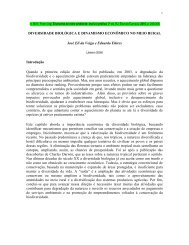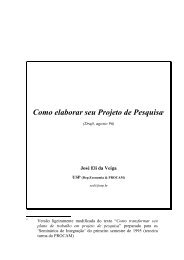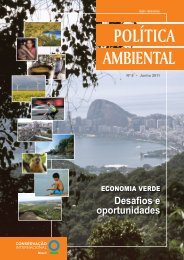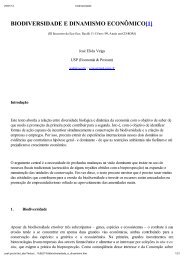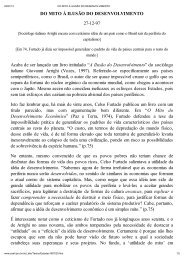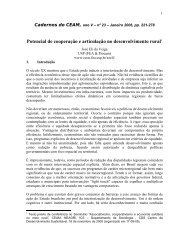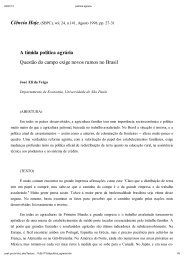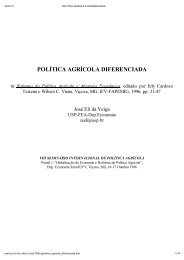sustainable development 20 years on from the ... - José Eli da Veiga
sustainable development 20 years on from the ... - José Eli da Veiga
sustainable development 20 years on from the ... - José Eli da Veiga
Create successful ePaper yourself
Turn your PDF publications into a flip-book with our unique Google optimized e-Paper software.
18<br />
rights approach identifies, firstly, rights holders and <strong>the</strong> object of those rights; and sec<strong>on</strong>dly, <strong>the</strong><br />
corresp<strong>on</strong>ding duty bearers and <strong>the</strong> obligati<strong>on</strong>s pertaining to <strong>the</strong>m. Likewise, <strong>the</strong> approach aims to<br />
streng<strong>the</strong>n <strong>the</strong> capacity of rights holders to uphold <strong>the</strong>ir rights and help duty bearers fulfil <strong>the</strong>ir<br />
obligati<strong>on</strong>s. It provides tools to enable people to participate in formulating policy and in demanding<br />
acti<strong>on</strong> <strong>from</strong> <strong>the</strong> State (OHCHR, <str<strong>on</strong>g>20</str<strong>on</strong>g>06). The approach emphasizes <strong>the</strong> need to improve accountability<br />
systems and ensure access to informati<strong>on</strong> <strong>on</strong> envir<strong>on</strong>mental issues. It also defines <strong>the</strong> obligati<strong>on</strong> to<br />
implement specific policies targeting groups of people that are in situati<strong>on</strong>s of disadvantage as a result<br />
of discriminati<strong>on</strong>, poverty, health (for example, people living with HIV) and socioec<strong>on</strong>omic inequality<br />
(see chapters II and IV). 3<br />
The human rights principles set out below are directly related to <str<strong>on</strong>g>sustainable</str<strong>on</strong>g> <str<strong>on</strong>g>development</str<strong>on</strong>g> and reaffirm<br />
<strong>the</strong> importance of c<strong>on</strong>sidering all social groups in <str<strong>on</strong>g>sustainable</str<strong>on</strong>g> <str<strong>on</strong>g>development</str<strong>on</strong>g> policies. They are also c<strong>on</strong>sistent<br />
with principle 1 of <strong>the</strong> Rio Declarati<strong>on</strong>, which places <strong>the</strong> human being at <strong>the</strong> centre of <str<strong>on</strong>g>sustainable</str<strong>on</strong>g> <str<strong>on</strong>g>development</str<strong>on</strong>g><br />
c<strong>on</strong>cerns and with principle 10, which affirms <strong>the</strong> importance of citizen participati<strong>on</strong>:<br />
(i)<br />
The principles of equality and n<strong>on</strong>-discriminati<strong>on</strong> ensure that <strong>the</strong> poorest and excluded are<br />
not left behind in <strong>the</strong> drive to eradicate poverty and achieve <str<strong>on</strong>g>sustainable</str<strong>on</strong>g> <str<strong>on</strong>g>development</str<strong>on</strong>g>.<br />
(ii) The accountability principle ensures greater commitment and transparency in nati<strong>on</strong>al and<br />
internati<strong>on</strong>al efforts to clarify <strong>the</strong> duties and resp<strong>on</strong>sibilities of developing countries, d<strong>on</strong>or<br />
States and n<strong>on</strong>-State actors.<br />
(iii) The participati<strong>on</strong> principle ensures that people, particularly <strong>the</strong> poorest and excluded, are<br />
active participants ra<strong>the</strong>r than passive recipients in terms of poverty eradicati<strong>on</strong> and<br />
<str<strong>on</strong>g>sustainable</str<strong>on</strong>g> <str<strong>on</strong>g>development</str<strong>on</strong>g>.<br />
Under <strong>the</strong> rights approach, assuring human rights —including those relating to participati<strong>on</strong> by<br />
various social groups in transiti<strong>on</strong> to <str<strong>on</strong>g>sustainable</str<strong>on</strong>g> <str<strong>on</strong>g>development</str<strong>on</strong>g>— is not an opti<strong>on</strong> for governments, but an<br />
obligati<strong>on</strong> under internati<strong>on</strong>ally assumed commitments. This needs to be reflected in <strong>the</strong> priority accorded<br />
to those topics in public programmes and budgets. An essential step in ensuring social participati<strong>on</strong> and<br />
<strong>the</strong> representativeness of groups identified by <strong>the</strong> Rio Declarati<strong>on</strong> is <strong>the</strong> ratificati<strong>on</strong> and implementati<strong>on</strong><br />
of <strong>the</strong> C<strong>on</strong>venti<strong>on</strong> <strong>on</strong> <strong>the</strong> <strong>Eli</strong>minati<strong>on</strong> of All Forms of Discriminati<strong>on</strong> against Women, <strong>the</strong> C<strong>on</strong>venti<strong>on</strong> <strong>on</strong><br />
<strong>the</strong> Rights of <strong>the</strong> Child and <strong>the</strong> United Nati<strong>on</strong>s Declarati<strong>on</strong> <strong>on</strong> <strong>the</strong> Rights of Indigenous Peoples<br />
(OHCHR, <str<strong>on</strong>g>20</str<strong>on</strong>g>08).<br />
The Rio principles should also be interpreted in light of <strong>the</strong> evoluti<strong>on</strong> of <strong>the</strong> c<strong>on</strong>cepts and<br />
approaches adopted by <strong>the</strong> internati<strong>on</strong>al community, under <strong>the</strong> Platform for Acti<strong>on</strong> of <strong>the</strong> Fourth World<br />
C<strong>on</strong>ference <strong>on</strong> Women, held in Beijing in 1995, at subsequent c<strong>on</strong>ferences <strong>on</strong> women and at <strong>the</strong><br />
Internati<strong>on</strong>al C<strong>on</strong>ference <strong>on</strong> Populati<strong>on</strong> and Development, held in Cairo in 1994. In accor<strong>da</strong>nce with<br />
principle 8 of <strong>the</strong> Rio Declarati<strong>on</strong>, it was recognized that, to achieve <str<strong>on</strong>g>sustainable</str<strong>on</strong>g> <str<strong>on</strong>g>development</str<strong>on</strong>g> and a better<br />
quality of life for people, States should reduce and ultimately eliminate un<str<strong>on</strong>g>sustainable</str<strong>on</strong>g> patterns of<br />
producti<strong>on</strong> and c<strong>on</strong>sumpti<strong>on</strong>, and promote appropriate policies, including populati<strong>on</strong> policies, so as to<br />
equitably meet <strong>the</strong> populati<strong>on</strong>, <str<strong>on</strong>g>development</str<strong>on</strong>g> and envir<strong>on</strong>ment needs of present and future generati<strong>on</strong>s. In<br />
3<br />
This report refers to “disadvantaged groups”, which include women, indigenous peoples, Afro-descen<strong>da</strong>nts,<br />
older pers<strong>on</strong>s, children and <strong>the</strong> disabled, in situati<strong>on</strong>s of “vulnerability” arising <strong>from</strong> c<strong>on</strong>diti<strong>on</strong>s of<br />
discriminati<strong>on</strong>, poverty, health and socioec<strong>on</strong>omic inequality. These situati<strong>on</strong>s prevent <strong>the</strong>m <strong>from</strong> gaining access<br />
to services, resources, educati<strong>on</strong> and basic informati<strong>on</strong>, which weakens <strong>the</strong>ir capacity to overcome impacts and<br />
puts <strong>the</strong>m at greater risk.



